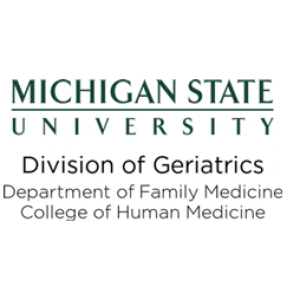GREETS: Geriatric rural extension of expertise through tele–geriatric services. An initiative for enhancement of support for clinicians and Geriatrics workforce
Objectives:
- Provide sustainable support to rural primary care physicians, assisted facilities, hospitals and nursing homes in delivery evidence based of high-quality care for older adults through consultative services
- To reduce falls, ED visits, readmission and other national outcome measures
- Extension of health care work force through training and education through virtual health delivery system
Targeted population:
Community bound older adults, residents of assisted facilities and Nursing home residents with dementia and other chronic health conditions in rural Michigan, designated underserved area
Pilot includes:
- Selected outpatient practice
- Assisted facilities
- Long term care facilities
- Outpatient clinics of health system
- Critical access hospital-based practice
- Critical access hospital
Proposed Interventions
A- A virtual clinical service aimed at outpatient primary care for provision of geriatric care support. The service will provide virtual comprehensive geriatric assessment, a consultative service through videoconference for patients at primary care office.
B- interdisciplinary team based weekly consults for targeted nursing homes providing expertise in managing falls, management of high-risk behavioral issues in patients with dementia and medication management
C- Hospital consultation for elder patients
D- Educational programs for training health professional in caring for vulnerable population
MSU department of Family Medicine is through its dedicated virtual health initiative, which is aimed at addressing these rising challenges of access to care, closing hospitals and lack of specialized care such as geriatric medicine expertise to vulnerable older adults in rural communities. MSU has strong network of residencies and community campuses, along with established collaboration with rural stakeholders, namely skilled care facilities, assisted facilities, academic and clinical rural family medicine physicians place them in ideal position to implement GREET intervention for provision of evidence based geriatric care for rural Michigan vulnerable older adults. Moreover, the team members have significant experience in program development and support from the institution to maintain a sustainable intervention of virtual care through telemedicine innovation. MSU is already providing a sustainable telemedicine services in psychiatry and oncology in remote communities in the state of Michigan through existing network.
This pilot program is going to have a rigorous evaluation for suitability, sustainability and would be further evaluated by stake holders, patients and our team for its outcome on health measures and potential for suitability to be delivered using tele geriatric and other forms of virtual delivery mechanisms. The measures chosen will reflect the impact of virtual health services on access of patient centered care, cost of care and clinical outcomes of older adults in rural communities. An example is reduction in falls in nursing home residents and ED visit, which are a significant financial and resource intensive burden on struggling critical access hospitals. In GREET intervention our plan is to put together several geriatricians led team of dedicated caregivers, working with primary care offices, hospital system and nursing homes who will provide much needed geriatric consultative services, over the two-year project. They will work with coordinators designated at each point of care, using a HIPPA compliant telehealth platform to provide needed services both on an emergent and scheduled basis for physicians needing such consultative support for their patients in chosen community. The team will use the existing MSU dementia network to provide work force training at a regular basis through didactic modules, led by Dr. Joan Illardo, who is experienced in successfully providing such work force training in the past. Regular CME clinical training will also be offered for primary physicians for enhancing their skills.
Other health care providers will receive didactic training including effective patient-provider communications; approaching patients with dementia and management of difficult behaviors and other caregiving issues in older adult such as abuse and maltreatment screening and interventions. provider and patient health literacy, advance directives and integrations of community-based resources into care plans. We will create a curriculum for virtual health in geriatric care for rural population. Moreover, introduce rural virtual health as part of training for Family and Internal Medicine Residencies to train future health care providers. We will conduct surveys for patients, rural physicians and health system to measure satisfaction and impact, addition to the chosen outcome measures. We anticipate that our team will present the findings in national conferences and publish articles of their analysis of outcome of this intervention in relevant academic journals. The results will be used to determine, potential of replication, sustainability and expansion of this pilot virtual health intervention across the country in rural communities.
Measurable Impact
- High impact on patient centered care with virtual geriatric support on quality of care
- Impact of the model on falls, admissions, readmissions to hospital, Emergency room visits and cost of care
- Survey of satisfaction among supported primary physicians, health systems, nursing homes, caregivers and patients
- Results of the analysis of pre- post interventions, outcome and cost-effectiveness using the high impact clinical quality measures will be
- Workforce training impact on quality measures used to inform development of provider payment and incentive models.



